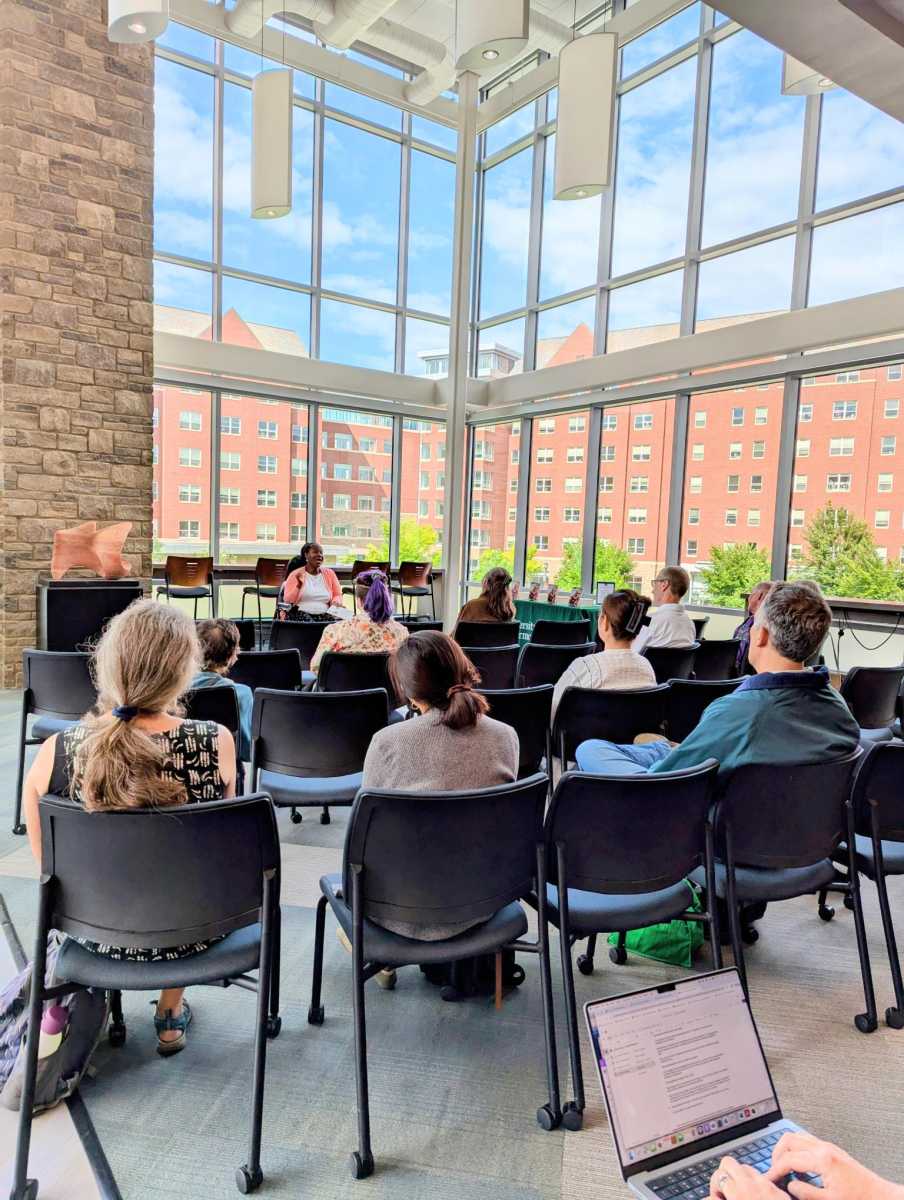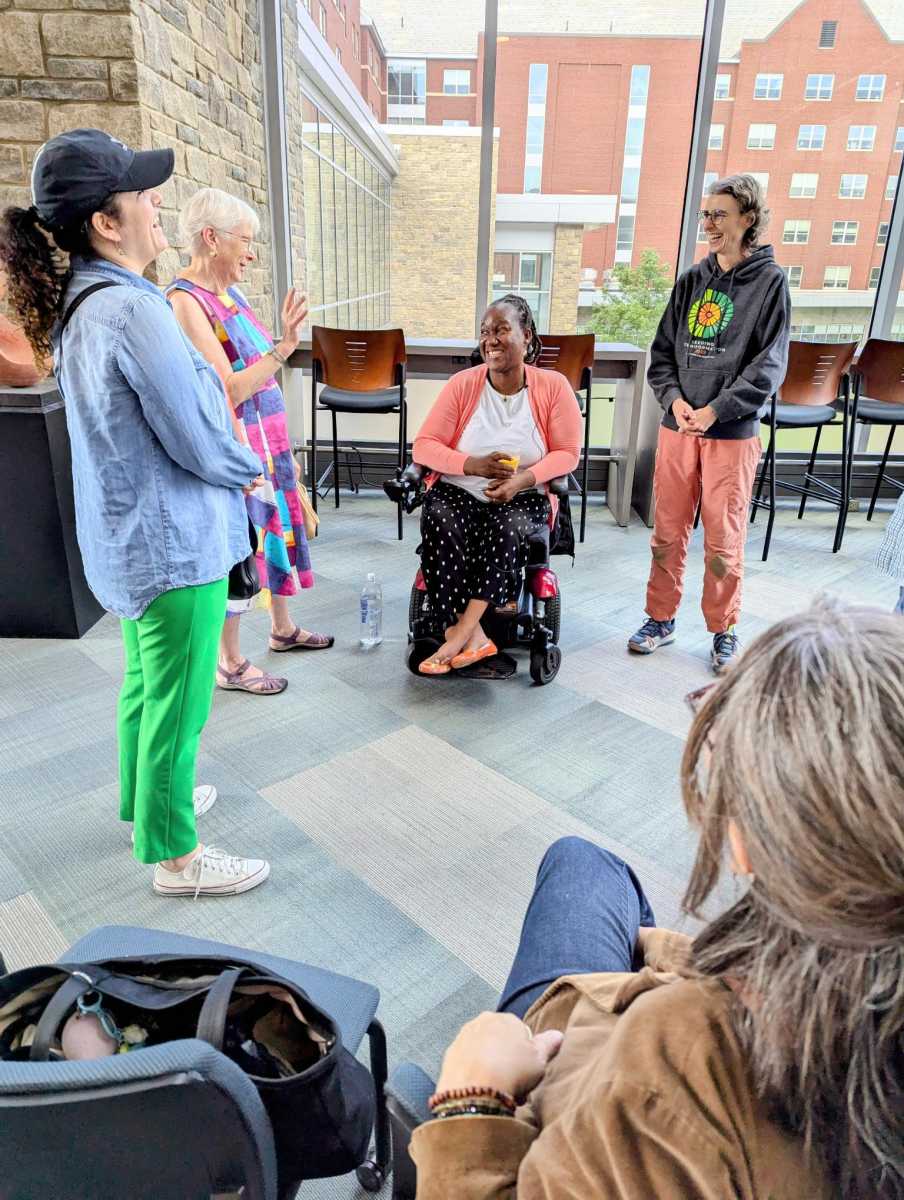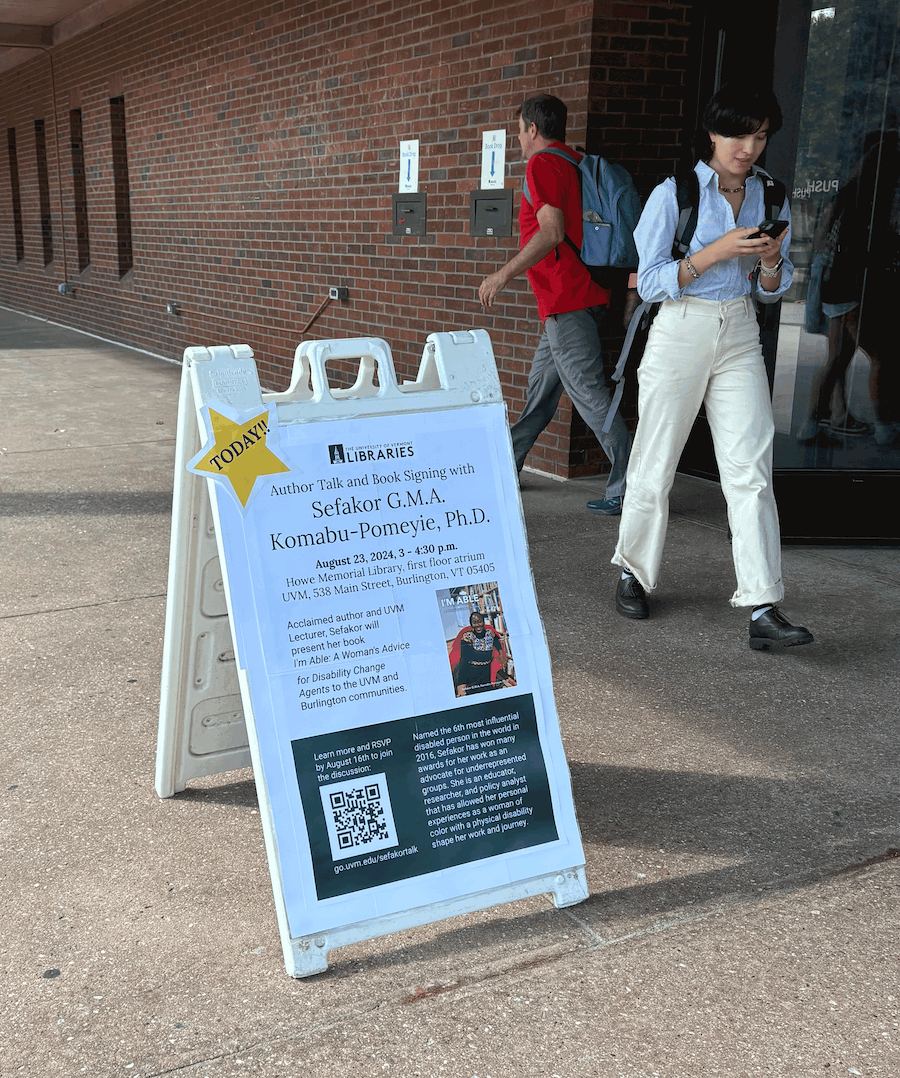
On a Friday afternoon in August, Sefakor G.M.A. Komabu-Pomeyie, Ph.D. commanded a crowd of about 20 in the Howe Memorial Library atrium to hear her read from her book and engage in conversation about the topic of disability. The UVM Libraries hosted the acclaimed author, advocate for the underrepresented, UVM lecturer, and new coordinator of DEI efforts for the College of Nursing and Health Sciences, Komabu-Pomeyie, to read from her memoir, "I’m Able: A Woman’s Advice for Disability Change Agents."
Komabu-Pomeyie's introduction was warm: "I feel like going round, shaking hands and hugging you. Your presence means so much to me."
Chapter 2: "The Fever"
Komabu-Pomeyie said she would not waste time, but would prefer to ignite the crowd by reading aloud the second chapter of her book, "The Fever." The story did not disappoint. Komabu-Pomeyie shared a first-person account of her eight-year-old self who, over the course of several days, went from having a fever to unable to feel her lower limbs.
The hospital doctor in her native Ghana told her mother: "Your daughter has parlytic polio. She's gradually losing her reflexes and she won't be able to walk again." Her fears were confirmed by her mother's tears.
The World Health Organization indicates that polio, a viral disease, usually affects people under age five, by multiplying in the intestines and then invading the rest of the body. Komabu-Pomeyie shared that at the time of her infancy, the government-issued vaccine she received had expired, leaving her susceptible to the preventable disease.
Once stable and sent home from the hospital, Komabu-Pomeyie could only crawl on her belly to get around, and quickly watched her disability rob the hope and joy from her family. One older neighbor came and suggested they throw the child out into the forest so that she could suffer the "fate of the spirits children" -- an old-world belief that children who are sick are out of favor with a god and should be killed (Komabu-Pomeyie said that this practice has been illegal in Ghana since 2013).
Her mother sent the woman away, and began taking Komabu-Pomeyie places with her, strapped to her back. She attended church with her mother. She attended her work in the local library, hidden from sight while there. She quickly learned the world was open to her, but that as a disabled person a dichotomy existed – one that she continues to navigate while helping others do the same.
Komabu-Pomeyie's father's embarrassment proved too much, and he eventually left the family for good, sharing his feelings in a letter. He said he could not live with "that thing" anymore – a reference to his child. His daughter's disability had brought much shame to this prominent community police officer, as well as to his extended family.
Komabu-Pomeyie persevered, and ultimately thrived. As an international advocate for underrepresented people with disabilities around the globe, her experiences include serving as an international disability rights advocate, educator, researcher, and policy analyst for the UN Convention on the Rights of Persons with Disability (UNCRPD), and as the Resource Center Coordinator of the Ghana Education Service. In 2016, Sefakor was named the 6th most influential disabled person in the world.
Discussion about disability
 With her listeners engaged, Komabu-Pomeyie engaged them in a discussion about the topic of disability. She shared that she's seen it feel taboo across cultures – not just in her childhood Africa or her time in Europe, but even in her adult home in Vermont. People don't know how to talk about disability.
With her listeners engaged, Komabu-Pomeyie engaged them in a discussion about the topic of disability. She shared that she's seen it feel taboo across cultures – not just in her childhood Africa or her time in Europe, but even in her adult home in Vermont. People don't know how to talk about disability.
Was her father's shame societal? Ego? All of the above? What influence do cultural beliefs have on a family? Does the word "disability" bring negative connotations? Why? In her book, and in person, Komabu-Pomeyie peppered her listeners with these questions to draw them closer to her story and to open a dialogue.
Komabu-Pomeyie encouraged attendees to share their thoughts about why it's so hard to engage in these conversations. Some offered that they might worry about offending a disabled person or didn't know how to begin a conversation about their disability, but Komabu-Pomeyie offered that if we destigmatize the topic through talk, then "disability" becomes just a word that loses its power.
But Komabu-Pomeyie acknowledged that this is her journey, and that for a disabled person there are two ideologies in the room in existence at all times. She explained that to survive in our culture, you must sometimes "declare" a disability in order to receive accommodations, supports or services, but that each disabled individual is also a capable and able person -- also worthy of declaration. This influences how a disabled person might feel in their own skin from day-to-day, situation-to-situation, she said.
Komabu-Pomeyie shared during discussion that her father is now her friend.
To buy the book
"I’m Able: A Woman’s Advice for Disability Change Agents." is available for purchase on Amazon, and you can learn more about this UVM author and advocate.
UVM Libraries' support of faculty authors
The UVM Libraries hope to continue with periodic faculty author talks and signings. These events will be open to all in the UVM community as well as our local community. If you're interested in sharing your publication, please email libcomm@uvm.edu. 
